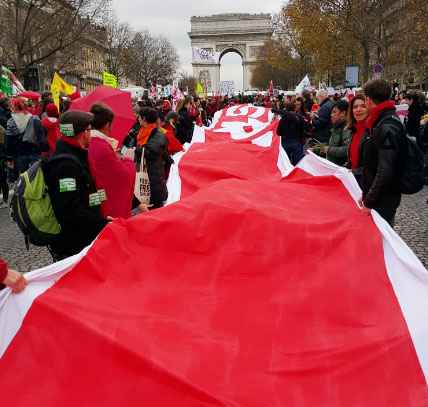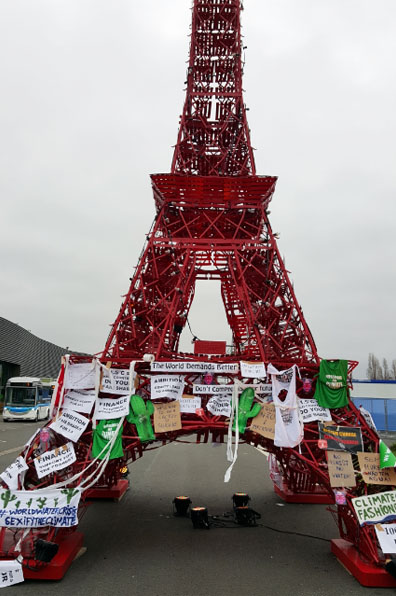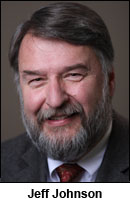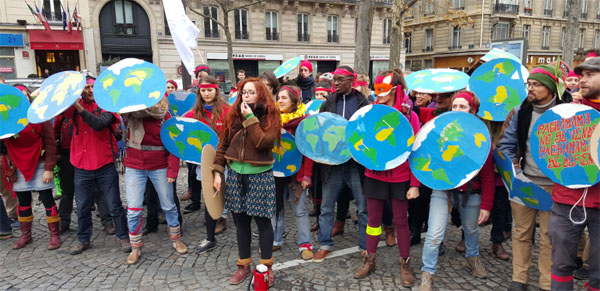NATIONAL
From Paris: ‘We are unstoppable. Another world is possible’
Jeff Johnson, President of the Washington State Labor Council, AFL-CIO, is part of the labor delegation attending the Paris Climate Conference (COP 21), advocating for policies that aggressively address climate change while providing for a “Just Transition” that invests in the communities and working families that will be hardest hit by the transition away from a fossil fuel-based economy.
By JEFF JOHNSON
Special to The Stand
PARIS (Dec. 14, 2015) — COP 21 came to a close Saturday afternoon, Dec. 12. As international delegates finalized text of the Paris document and prepared for celebratory photos, the streets of Paris erupted with a stronger message: “We are unstoppable. Another world is possible,”and “1.5 to stay alive,” and “As the seas rise, we will rise.”
 Civil society, unions, young and old, 10,000 strong lined the streets of the Champs-Elysees with red flowers and kilometers of red cloth representing red lines that can not be crossed if we are to have a just and livable planet. Unburdened by diplomatic text and nation state hierarchy, people raised their voices to recognize that to actually save the planet the majority of oil, gas, and coal reserves need to stay in the ground. And that a transformation of the scale that it will take to reverse the climate trends that have already created millions of water and food refugees, will require placing human rights, indigenous rights, gender equality and a just transition at the very core of the transformation.
Civil society, unions, young and old, 10,000 strong lined the streets of the Champs-Elysees with red flowers and kilometers of red cloth representing red lines that can not be crossed if we are to have a just and livable planet. Unburdened by diplomatic text and nation state hierarchy, people raised their voices to recognize that to actually save the planet the majority of oil, gas, and coal reserves need to stay in the ground. And that a transformation of the scale that it will take to reverse the climate trends that have already created millions of water and food refugees, will require placing human rights, indigenous rights, gender equality and a just transition at the very core of the transformation.
It is easy to get wrapped up the COP 21 process with all of its complexities and emotional tumult, but for all the strengths and shortcomings of the final document, the real impact is that 195 countries, 140 national leaders, civil society groups, unions, and businesses have begun to recognize that we are in a race against time to save our planet.
Sharon Burroughs, President of the International Trade Union Confederation, put it this way:
“The race to stabilize the climate has begun, but tragically, too many governments still lack ambition for the survival of their people. But trade unions know that the road was never to Paris, but through Paris and our resolve to manage a just transition in the face of the largest and most rapid industrial transformation in human history is stronger than ever.”
The most lasting impression that I will have of the Paris Climate talks is the level of knowledge about climate change, the understanding of the impacts that it is having and will have on our work and our standards of living, and the commitment to climate justice that I heard from union leaders and representatives of civil society from India, Brazil, Mexico, Senegal, Canada, France, Germany, Norway, Peru, Australia, New Zealand, Great Britain, and from all over the world.
It gives me great hope that we are not alone in Washington state and that our actions do make a difference. Every action to reduce carbon makes a difference. Every conversation about a Just Transition makes a difference. If we do it right, the fight to reverse climate change is the fight to rebuild shared prosperity for all of us, not just the few.
With regards to the text of the Paris Agreement there are some strengths and weaknesses. The document does commit countries to “holding the global average temperature to well below 2 degrees C above pre-industrial levels and to pursue efforts to limit temperature increase to 1.5 degree C above pre-industrial levels.”
A growing scientific consensus is that we may be too late to limit temperature increase to 1.5 degree C unless we dramatically increase our global emission reduction pledges before the year 2020 when the reduction regime officially begins. While the text would have been significantly stronger if it required country’s to raise their pledges before 2020 and to establish an enforceable way to review both individual country and cumulative emission reduction pledges, the agreement does create a review discussion in 2018 and then establishes a five-year review process beginning in 2025.
At the 2009 Copenhagen climate talks a goal of developed countries raising $100 billion annually for adaptation financing for developing countries was put forth. To date about $62.5 billion has been pledged. However, the Paris text, at the urging primarily of the United States, the $100 billion figure was removed from the document and while the text still recognizes the obligation of developed countries to help developing countries, the financing will now cover both mitigation and adaptation purposes. In light of the huge cost it will take to lower carbon emissions and to adapt to the devastating impacts of climate change, some estimates place it $1 trillion a year, it is clear that we far from making the most elementary steps needed to globally finance the transition.
 Finally language regarding Just Transition, decent work, quality jobs, and human rights are recognized in the document, but only in the non-binding preamble. Nonetheless, this is a first step. Unions and civil society groups must keep pressing on all levels of government and with businesses at the bargaining table that a transformation of our economy without justice is unacceptable.
Finally language regarding Just Transition, decent work, quality jobs, and human rights are recognized in the document, but only in the non-binding preamble. Nonetheless, this is a first step. Unions and civil society groups must keep pressing on all levels of government and with businesses at the bargaining table that a transformation of our economy without justice is unacceptable.
The Paris Climate Agreement does give us a starting point from which to create a global renewable energy economy. And also a starting point to create a climate and economic transformation rooted in equity and justice.
Naomi Klein quotes Movement Generation organizer, Quinton Sankofa, “Transition is inevitable, justice is not.”
No truer words have been spoken. It is our job as union leaders and civil society leaders to make sure that no worker, community, or country is left behind because to do so is simply to perpetuate the inequalities that define our current fossil fuel regime.
 Jeff Johnson is President of the Washington State Labor Council, AFL-CIO, the largest labor organization in the Evergreen State, representing the interests of more than 500 local unions and 400,000 rank-and-file union members.
Jeff Johnson is President of the Washington State Labor Council, AFL-CIO, the largest labor organization in the Evergreen State, representing the interests of more than 500 local unions and 400,000 rank-and-file union members.
ALSO see the 2015 Washington State Labor Council resolution on ”Climate and Jobs” approved by delegates representing unions from across the state.






